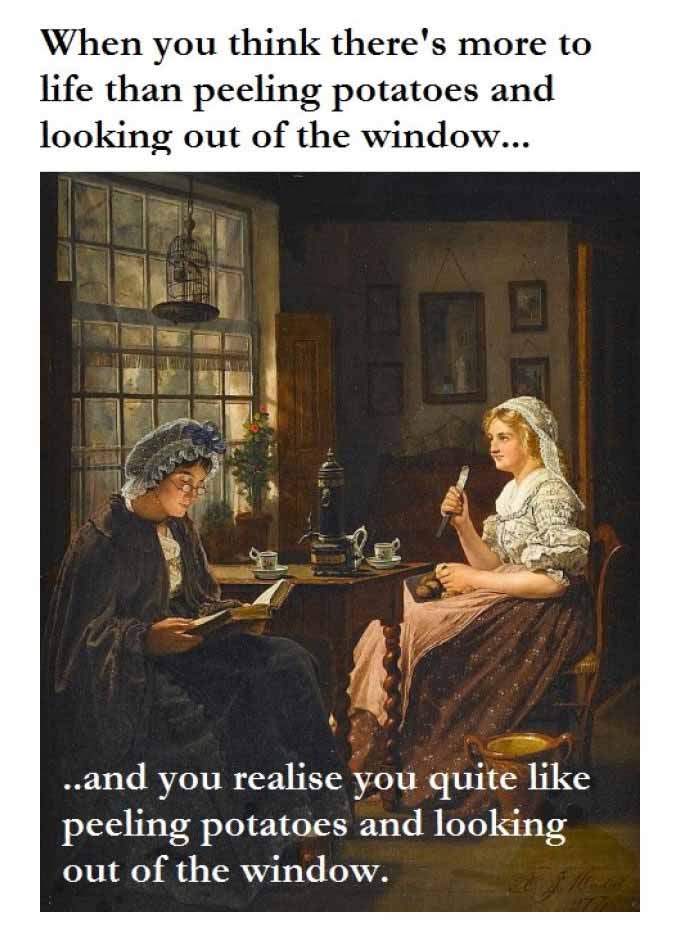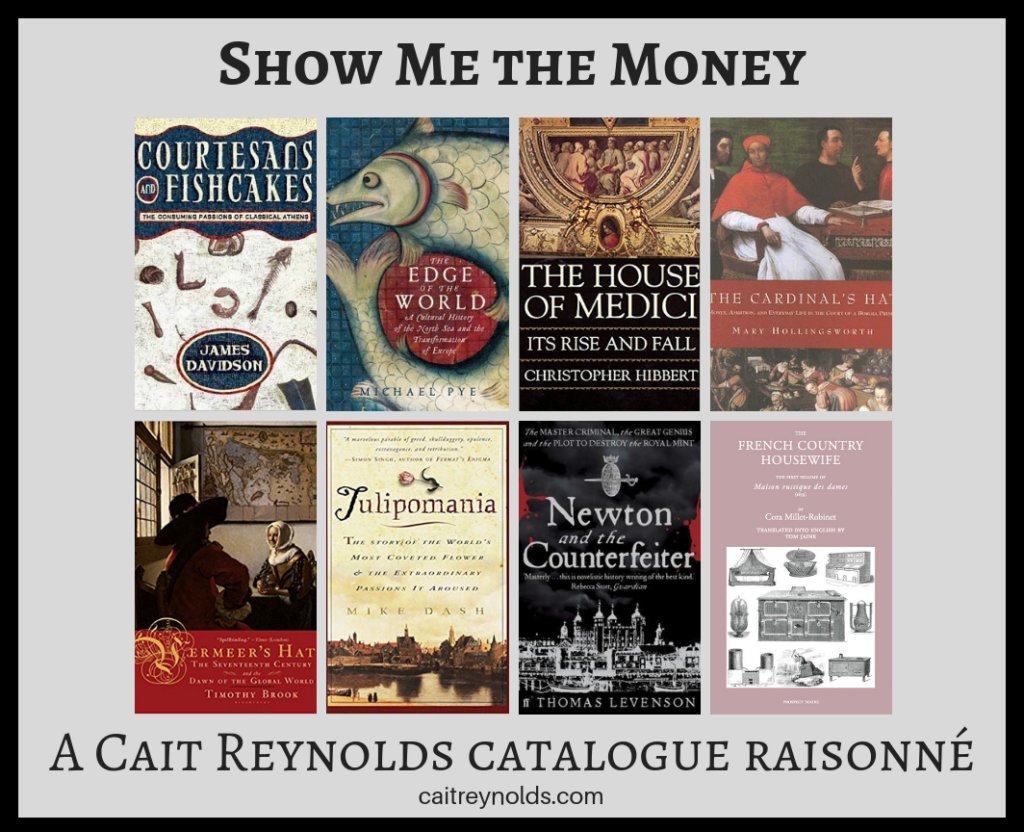Money is fundamental to our lives but taboo in polite conversation…much like sex. But just like sex, money is one of the main drivers of human behavior. And what do we pattern our characters’ behavior on? Yup. Exactly.
Now, of course, I would never be so crass as to suggest that any of our protagonists are motivated by such indelicate—even sordid—things such as money or sex (*rolls eyes, but soldiers on*). Protagonists are always ultimately convinced to act solely from altruism, and villains are the ones who simply must be avaricious and lustful. (*accidentally rolls eyes so hard I fall over backward*)

Except, sex and money are just shorthand proxies for deeper, more complex psychological stimuli. In this case, ‘sex’ as a motivator encompasses everything from our biological impetus to procreate—because the world by now totally needs more humans *eye roll…OW!*—to the pleasures and comforts of companionship.
‘Money’ is the stand-in for scarcity, acquisition, and competition for what we need to survive, from basics like food and water to the finer points of existential fulfillment.
And, while plotting is totally Kristen’s wheelhouse, it’s safe to say all plots boil down to one basic premise: a character wants/needs/lacks something and must overcome obstacles to obtain it.
No matter what genre we write, character motivation matters. Therefore, money matters.
Haves, Have-Nots, and Have-a-Snickers-Cait-You’re-not-Yourself
I am not the kindest editor, and I’m a downright PMS-ridden-harpy when it comes to historical anachronisms.
Wanna trigger the transformation? Just drop any of the following little gems into prose:
Characters using generic ‘gold coins’ to pay for bread and cheese (a whole other rage topic for another time);
WORSE, using those same coins across international borders (because universal currency, exchange rates, and value of goods was so standard and easily handled. Genghis Khan’s forced standardization of currency conversion across his empire is a totally underrated achievement of his. Too bad Europe was all like, “Yeah, no, thanks, we’re good with our seventy-five-and-counting different currencies. Try back next century, yeah?”);
 Look, I get that researching and figuring out how to include depictions of money sounds about as much fun as listening to Gilbert Gottfried read Strunk & White at open mic night. But, we just have to suck it up and look at it as penance for our sins. Or something like that.
Look, I get that researching and figuring out how to include depictions of money sounds about as much fun as listening to Gilbert Gottfried read Strunk & White at open mic night. But, we just have to suck it up and look at it as penance for our sins. Or something like that.
Wanna see the harpy pop out again? Give me a servant girl with more wardrobe changes than a Lady Gaga concert. Or the poor farming family whose feisty, independent daughter is always buying and reading books. Or the Regency version of the Mary Sue Shopping Spree.
Quick, anybody got a Snickers? I’m feeling a little peckish.
Money doesn’t grow on trees
Here is the most important tip for using ye olde economics in historical fiction:
Ask questions.
What questions, you ask? (OMG, stop me, I’m so punny!)

ALL the questions, because to paraphrase/absolutely slaughter Socrates: we’re not always smart enough to know what we don’t know.Here’s a basic set of questions I use:
Where (literally) in the world are the characters? What are the local industries, geographical resources, etc.? Ship-building on the coast, sheep-shearing inland.
What are the major imports/exports of that region or country at the time? Robin Hood didn’t ever eat corn-on-the-cob (corn is SO 1492!).
What do the characters do for a living? How much is the wage or income for that time period/region/profession/social status? What would the modern equivalent be? The world wasn’t just nobles, peasants, and beggars. There were comfortable—even wealthy—craftsmen, tradesmen, physicians, lawyers, accountants, etc.
What is the currency of the region/country? What were the denominations in use? Was currency used at all, or was it a barter system? Nowadays, who remembers the French ‘franc’? How about the French ‘livre’ or ‘louis d’or’? Okay, yes, I do, but I’m a nerd.
Did they have servants? How many and what kind? What did they pay them? Elbow grease was the original renewable energy source, and even relatively poor families might have a ‘girl’ come in once a week to help out.
What exactly would a character own? Capsule wardrobe or queen’s trousseau?
If you are feeling a little freaked and a lot overwhelmed by the seemingly enormous, torturous research paper I have just assigned you…don’t. This is fiction, and while relative accuracy is necessary, footnotes are not required.In fact, I’m about to show you how to cheat.
My money’s on the answer…
I totally get it that not everyone dreams about spending hours organizing one’s non-fiction library by time period-topic-region. *cough*

So, for those out there who just want to get the job done, I present…the quick and dirty way to research just about anything for historical fiction.
Make sure you have a way to organize the research you gather because the last thing any writer wants is to find that *exact* detail we needed, then waste hours trying to find that page again.
Always start with Wikipedia. Print out or save the relevant articles. Make note of dates, places, foreign language words that will need translation if used in the story, specific terms, etc.
Don’t click away yet! Scroll down to the bottom and look at the footnotes! There’s gold in them thar hills! The cited books and articles are the next level of resources for when there’s time/interest.
Next up? Ask Dr. Google. The first entry is almost always Wikipedia, but usually the next hits are also established sources. Google also has great ye olde currency conversion links.
If you know an impecunious doctoral student, bribe them with home-cooked food in exchange for help accessing JStor, one of the largest online repositories of scholarly articles. Also, many public libraries and alma maters offer a wide range of research databases.
Often, Google provides the most precise results from Google Books (because Google is a self-referential bastard). Google Books basically is like a mini-Project Gutenberg (where all kinds of out-of-copyright primary sources are available for free download). Google Books will even HIGHLIGHT the relevant phrases on the pages of the book, and you just can’t get more silver-platter-research than that.
Adding it all up
All joking aside, here’s the process in a nutshell:
- Get your questions ready.
- Get ready to organize your findings so you can find ’em again.
- Go to Wikipedia and print the heck out of the articles…and don’t forget the footnotes!
- Do a Google search to find other professional or academic resources.
- If you need to dig deeper, go to the public library or use alumni privileges to access JStor and other academic and research databases.
- Search Google Books for info hidden in rare and out-of-print books, and Project Gutenberg for free, downloadable primary sources.

Time is money
I often get asked, “How long should I spend researching?”
The answer is easy.
It depends.
*ducks*

No, really, it does depend on a lot of individually-determined factors, like how familiar we already are with a time period, how comfortable we are with historical research, or even how much mind-numbing 18th-century prose we can take reading before we tear our hair out, wonder WTF we are doing with our lives, and go become meter maids because that looks like so much more fun than this *ish*.
However, I do think a good milestone is when our brains ‘click.’ Certain names, dates, facts, or events keep popping up consistently, and we begin to feel an almost-comfortable familiarity with them. Another good test is when we don’t need our notes to tell our long-suffering significant other/friend/stranger-duct-taped-to-chair/cellmate about the time period and what people lived like and could afford.

Like all things in writing (and life, but that’s another dissertation for another time), learning to research money takes time and practice. Luckily for penurious writers, the one thing researching money doesn’t take…is money.
(Unless people want to give me Amazon gift cards so I can make headway on my 35-page book wish list. Then I’ll totally take the money because then I can get more books and make things like this ‘Catalogue Raisonné about money, trade, economics, and shopping in history.)

Want more of these Catalogues Raisonnes? I have a whole page of them over on my website. Just click the image!
NEW CLASS!
 Instructor: Cait Reynolds
Instructor: Cait Reynolds
Price: $55.00 USD
Where: W.A.N.A. Digital Classroom
When: Friday, November 16, 2018. 7:00 P.M. – 9:00 P.M. EST
So…how’s NaNoWriMo going for you?
The first 10k words? No problem. Another 5k? I can pants that.
Now…I’m at 18k words with 14 days left…and 0 clues about where to go from here.
Sound familiar? This is what I call ‘The Sticky Middle,’ and it is a treacherous swamp that can swallow even the most accomplished, focused writers. It is the moment when writers are most likely to be pulled under by the forces of writer’s block, insecurity, and exhaustion.
The Sticky Middle is the root cause of 98% (I’m guessing here, but I’m pretty darn sure I’m right) of all unfinished first drafts. This class will teach you how to get out of The Sticky Middle…not just for NaNoWriMo, but for every book you write from now on!
This class will cover:
- Walking into Quicksand: Half of getting out of The Sticky Middle is knowing how we got in there in the first place…and how to avoid making these early mistakes next time;
- Maslow Stripping: Assessing where characters are when we get stuck…and what we need to take away from them in order to move forward;
- The Treasure Map: Making sure we have our eye on the prize (i.e. the ending), and how to use that to get through The Sticky Middle;
- Stop! Break it Down!: (Couldn’t help myself with that…) A blunt, practical way to tackle the amorphous goo that is The Sticky Middle and wrestle it into realistic, achievable, bite-size steps.
A recording of this class is also included with purchase.
REGISTER NOW!
About the Instructor:
 Cait Reynolds is a USA Today Bestselling Author and lives in Boston with her husband and neurotic dog. She discovered her passion for writing early and has bugged her family and friends with it ever since. She likes history, science, Jack Daniels, jewelry, pasta, and solitude.
Cait Reynolds is a USA Today Bestselling Author and lives in Boston with her husband and neurotic dog. She discovered her passion for writing early and has bugged her family and friends with it ever since. She likes history, science, Jack Daniels, jewelry, pasta, and solitude.








4 comments
2 pings
Skip to comment form
This is also good info for fantasy writers. Too often we overlook those details and the money is the same in every kingdom. 10 silver pennies for a bowl of gruel!
Thanks!
Paying gold for bread and cheese? That bread better be magic bread that never runs out, and the cheese better be cheese curdled out of the Milky Way or something. Sheesh. Copper was invented for a reason, people.
Another irk: medieval people drinking tea. Unless they’re Chinese, of course, in which case, drink on.
I haven’t been blogging much during NaNoWriMo, but I’m putting up a post or two about things I’ve been looking into when I suddenly Need To Know. Driver licensing in the 1930s, Jeyes Fluid, Horlicks, zombies…
“sex and money are just shorthand proxies for deeper, more complex psychological stimuli” >> Perhaps, for some people.
I know this post’s focus is on Money; however, I feel the urge to make you re-think, at least, the part of the sentence relating to Sex. You see, while it may encompass “the pleasures and comforts of companionship,” the fact is that… when Sex sucks… no amount of companionship can remedy for that. Substituting Companionship for sexual Satisfaction creates an Imbalance: it is unhealthy.
So… No. Sex is sex. It can encompass many other things, but, ultimately, it is just that: Sex.
Yaaas. Preach, sister.
As an aside, when English people speak of “corn,” pre-New-World, they mean “grains” or “kernels” or “seed of a cereal crop,” as in “barleycorn.” I was once reading a historical romance and totally finger-pointing at the poor author . . . until I did a little research.)
Which is your aptly-made point: do the research. XO (raises glass in a toast)
[…] Halvatzis explains how to write the story midpoint, Cait Reynolds examines how money drives drama, and Dawn Field explores truth and narrative: the two timelines of your […]
[…] course Our Heroes™ are going to pack food for their quest or steal it along the way (or buy it…why do they never have money to buy stuff?). Bread and cheese seems simple and safe to use. Yet, these details, as seemingly throwaway as they […]